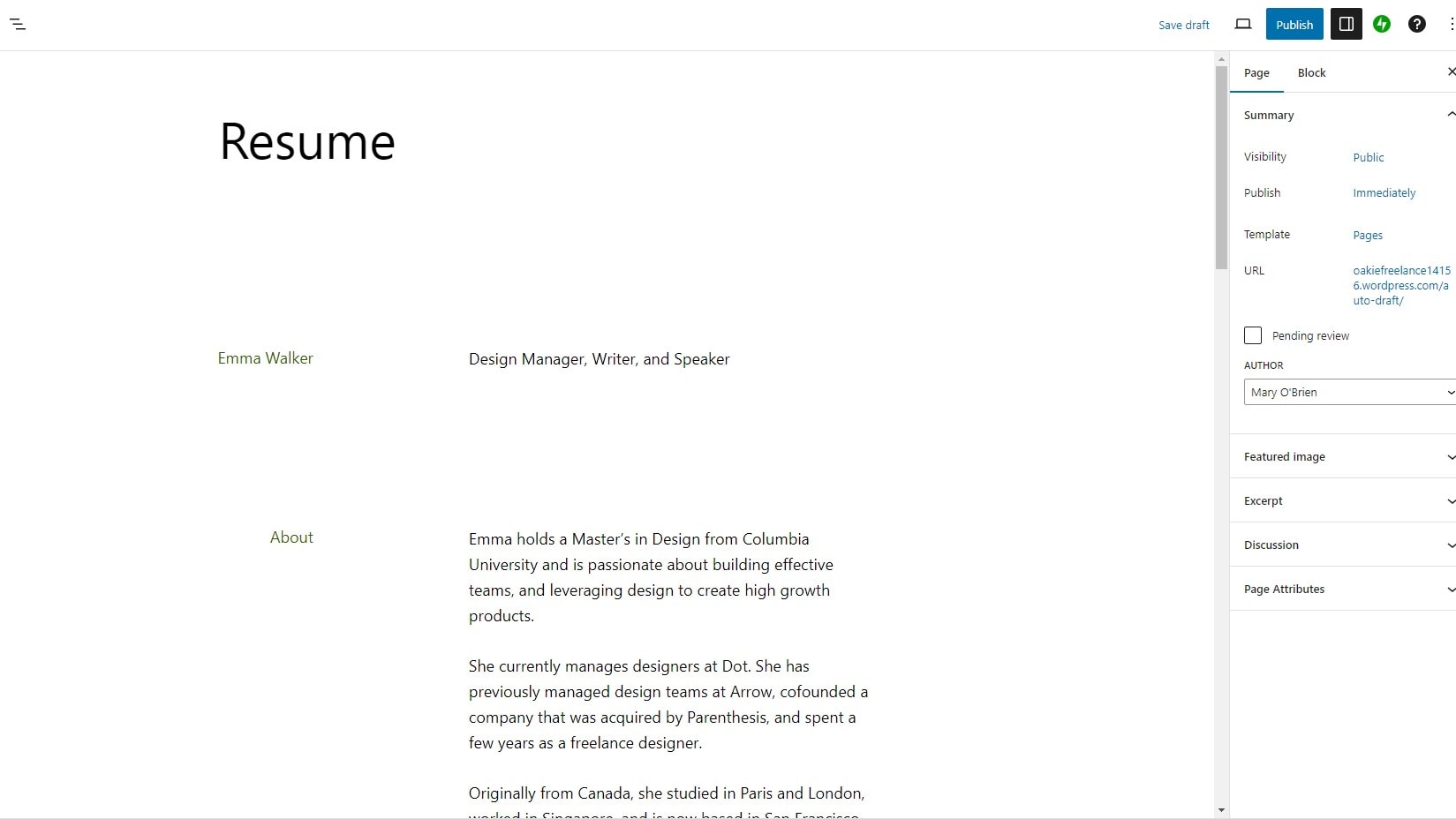HubSpot vs WordPress compared: Which is the best?
- 01HubSpot vs WordPress.com: overview
- 02What's the difference between HubSpot and WordPress.com?
- 03HubSpot pros and cons
- 04WordPress.com pros and cons
- 05HubSpot compared to WordPress.com
- 06WordPress.com compared to HubSpot
- 07Features comparison
- 08HubSpot vs WordPress.com: Which is the best for your business?
- 09Promotions on Prospecting software
- 10Alternatives to HubSpot & WordPress.com
Save up to $7,000 on HubSpot
HubSpot
75% off for 1 year
Save up to $7,000 on HubSpot
HubSpot
75% off for 1 year
To optimize your start-up's visibility, it's essential to design a high-impact website. Whether it's an online shop, a showcase site or a portfolio, whatever you need, you need to have an online presence to present your products and services. This will make it easier to attract and convince your future customers.
There are many tools available for designing a website. Making a choice from among the platforms available can be tricky. To help you make the right choice, we're going to take a look at Hubspot vs WordPress. We'll be comparing the differences and features of the two software packages to identify which is best suited to your business.
HubSpot vs WordPress.com: overview
When it comes to content management system software, HubSpot and WordPress are two leading contenders, each excelling in distinct areas to meet diverse user demands.
HubSpot is renowned for its comprehensive inbound marketing tools and seamless integration with CRM capabilities. It offers a user-friendly and all-in-one solution for businesses looking to create and manage their online presence. On the other hand, WordPress primarily focuses on website content management. It is an open-source platform with a vast library of themes and plugins, offering unparalleled customization options.
Now, let's dive into HubSpot vs. WordPress’s comparison to assist you in making an informed decision when selecting the optimal website platform tailored to your specific requirements.
What's the difference between HubSpot and WordPress.com?


If you're wondering what the main difference is between HubSpot and WordPress website creation software, we'd say it all depends on your objective. The WordPress platform is the one to consider if you want to create a site for your start-up without spending too much time or money on it. However, if you're looking for a site creation platform with full digital marketing functionality, then HubSpot is the best choice. In short, WordPress is ideal for designing a website, while HubSpot is relevant for developing a sales and marketing strategy.
WordPress has a lot going for it if you're looking for a tool that's easy to get to grips with and allows you to roll out a simple but attractive site as quickly as possible. Flexible and customisable, WordPress is also a free, open source solution. So you can start using it straight away, without spending any money, while benefiting from the support of a massive community of users and developers. However, if you want to go further, you may need additional technical skills and download a large number of plugins. WordPress software is perfect for creating a showcase site to raise your start-up's profile straight away.
If you don't just want to design a website, but also integrate it into your overall marketing strategy, HubSpot is a choice to seriously consider. It's true that it's more expensive for businesses and may lack the customisation options of WordPress. However, the HubSpot platform benefits from its perfect symbiosis with the other products in the HubSpot suite. In other words, you can access an all-in-one tool for creating content, implementing your marketing strategy, managing your sales and optimizing your customer service. For a site whose objective is to find leads and convert them efficiently, HubSpot is a powerful tool.
30% off Professional and Enterprise plans for 1 year across all Hubspot products on HubSpot
Get 30% off Professional and Enterprise plans for 1 year across all Hubspot products on HubSpot and up to $2,000 savings with Secret.
HubSpot pros and cons
What are the advantages of HubSpot?
- All-in-one marketing platform: HubSpot offers a comprehensive suite of marketing tools, including CRM, email marketing, social media management, content management, and analytics, all within a single platform.
- User-friendly interface: HubSpot's user interface is intuitive and beginner-friendly, making it accessible to users with varying levels of technical expertise. It offers drag-and-drop editors and customizable templates for easy content creation.
- Powerful analytics: HubSpot provides robust analytics and reporting features, allowing users to track website performance, monitor lead generation, and measure the effectiveness of marketing campaigns.
- Marketing automation: HubSpot's marketing automation capabilities enable businesses to automate repetitive tasks, nurture leads, and personalize marketing efforts.
- HubSpot Academy and community: HubSpot offers extensive educational resources through its Academy and a vibrant user community. Users can access free training courses, certifications, and a wealth of knowledge from the community, facilitating skill development and problem-solving.
What are the disadvantages of HubSpot?
- Costly: HubSpot's pricing can be relatively high for small businesses and startups, especially when opting for advanced features and scaling up.
- Learning curve: While user-friendly, HubSpot's full suite of tools may still require some time for users to become proficient, particularly for those new to digital marketing.
- Limited customization in free version: The free version of HubSpot has limitations in terms of customization and functionality, which may not fully meet the needs of larger businesses.
- Dependency on HubSpot ecosystem: Once you start using HubSpot, it can be challenging to migrate away from it due to the interconnected nature of its tools and data. This can lead to vendor lock-in.
- Limited e-commerce features: HubSpot's e-commerce capabilities are not as robust as dedicated e-commerce platforms like Shopify or WooCommerce, making it less suitable for businesses primarily focused on online sales.
Compare HubSpot to other tools
WordPress.com pros and cons
What are the advantages of WordPress.com?
- User-friendly: WordPress is known for its ease of use, making it accessible to users of all technical backgrounds. Its intuitive interface simplifies content creation and website management.
- Customization: WordPress offers extensive customization options through themes and plugins. Users can personalize their websites to meet specific design and functionality requirements.
- Large plugin ecosystem: The vast plugin library allows users to add various features and functionalities to their websites. Whether it's SEO optimization, e-commerce capabilities, or social media integration, there's a plugin for almost everything.
- SEO-friendly: WordPress is inherently optimized for search engines, with clean code and a range of SEO plugins available to enhance visibility and rankings.
- Active community and support: WordPress has a large and active user community, making it easy to find help, resources, and solutions to common issues. There are numerous forums, tutorials, and documentation available.
What are the disadvantages of WordPress.com?
- Security concerns: As an open-source platform, WordPress can be susceptible to security vulnerabilities if not properly maintained. Users must regularly update themes, plugins, and core files to mitigate risks.
- Plugin compatibility: While plugins offer flexibility, they can sometimes conflict with each other or with WordPress updates, leading to compatibility issues and potential site errors.
- Learning curve for advanced features: While basic usage is user-friendly, mastering advanced features, custom coding, or complex site configurations may require a steeper learning curve.
- Performance optimization required: To ensure optimal performance, users often need to invest in hosting, caching solutions, and performance optimization, especially for high-traffic websites.
- Responsibility for backups and security: Users are responsible for their website's backups and security measures. Without proper backup procedures, data loss can occur, and security breaches can have serious consequences.
Compare WordPress.com to other tools
HubSpot compared to WordPress.com
When comparing HubSpot and WordPress, HubSpot stands out for its all-in-one marketing platform and user-friendly interface, making it an attractive choice for businesses seeking comprehensive website and marketing solutions. HubSpot's pricing flexibility, including a free CRM plan and affordable paid tiers, suits startups and small businesses looking to establish a strong online presence without breaking the bank.
Both HubSpot and WordPress excel in creating and managing websites, but the choice between them depends on your specific requirements. HubSpot offers an integrated marketing and CRM solution, making it ideal for businesses aiming to attract, engage, and convert leads effectively.
Is HubSpot better than WordPress.com?
Deciding whether HubSpot is better than WordPress depends on your specific website and marketing requirements. HubSpot offers a comprehensive all-in-one marketing platform with an intuitive interface and a wide range of features tailored to various business needs. It enables you to manage your website, marketing, and customer relationships within a single platform, making it a compelling choice for businesses seeking an integrated solution.
HubSpot prioritizes user-friendliness and marketing automation, whereas WordPress is a versatile content management system (CMS) known for its customization options and extensive plugin ecosystem. WordPress is an ideal choice for individuals, bloggers, and businesses looking for full control over their website's design and functionality.
What is HubSpot best used for?
HubSpot is a versatile marketing and customer relationship management (CRM) platform, ideally suited for a wide range of use cases. Its strengths lie in providing a unified platform for businesses to attract, engage, and nurture leads, as well as manage customer relationships effectively.
Whether you're a small business owner looking to establish an online presence, a marketing professional aiming to automate and optimize campaigns, or a sales team seeking to close deals more efficiently, HubSpot's comprehensive suite of tools and features make it the ideal choice. Its adaptability and scalability cater to the unique needs of businesses of all sizes, making HubSpot an indispensable tool for enhancing marketing efforts and streamlining customer relationship management across various industries.
Can HubSpot replace WordPress.com?
HubSpot presents a compelling alternative to WordPress for businesses seeking an integrated marketing and website management solution. While WordPress excels in website customization and versatility, HubSpot's strengths lie in its all-in-one marketing platform and CRM capabilities, catering to a broader array of business needs.
With HubSpot, you can create and manage websites, run marketing campaigns, automate lead nurturing, and manage customer relationships seamlessly. Its user-friendly interface and marketing automation features make it a suitable choice for businesses aiming to enhance their online presence without compromising marketing effectiveness. Whether you require maximum website customization or seek a more integrated marketing and CRM solution, HubSpot provides a robust option that can potentially replace WordPress while addressing a wider range of business requirements.
Is HubSpot cheaper than WordPress.com?
When comparing the pricing of HubSpot and WordPress, there are notable differences to consider. HubSpot offers a range of pricing tiers, including a free CRM plan, but its premium marketing and CRM features come at a cost. HubSpot's pricing tends to be higher, particularly for businesses looking to access advanced marketing automation and CRM functionalities.
On the other hand, WordPress is an open-source platform that is free to use, making it an attractive option for budget-conscious users. While WordPress may seem more cost-effective initially, HubSpot's pricing structure can provide value for businesses seeking an integrated marketing and CRM solution.
Is there a better Prospecting software than HubSpot?
While HubSpot is a powerful marketing and CRM platform, it's essential to explore whether there might be a more suitable software for your specific marketing requirements.
Several notable alternatives to HubSpot in the marketing and CRM space include Salesforce, Marketo, Pardot, and Mailchimp.
The choice of marketing and CRM software depends on factors such as the complexity of your marketing campaigns, sales processes, and integration requirements. While HubSpot offers an integrated approach, other tools may excel in specific aspects or offer more specialized features for larger enterprises or industries with unique demands.
75% off for 1 year on HubSpot
Get 75% off for 1 year on HubSpot and up to $7,000 savings with Secret.
WordPress.com compared to HubSpot
When comparing WordPress and HubSpot, WordPress stands out with its versatility in website creation and content management, making it a top choice for individuals, businesses, and bloggers focused on building and customizing their online presence. WordPress's pricing structure is generally more budget-friendly, with the core platform being open-source and free to use. This affordability and extensive customization options cater to a wide range of website needs.
While both WordPress and HubSpot have their strengths, the choice between them depends on your specific website and marketing requirements. WordPress is the go-to option for website customization and affordability, while HubSpot provides a robust solution for businesses prioritizing integrated marketing and CRM functionalities to drive growth and engagement.
Is WordPress.com better than HubSpot?
The evaluation of whether WordPress is better than HubSpot depends on your organization's website management and marketing requirements. WordPress is a versatile tool for creating websites and managing content, proving popular for a range of different use cases, from showcase websites to blogs to individual portfolios. WordPress's affordability, extensive theme library, and plugin ecosystem cater to a wide range of website needs.
The decision between WordPress and HubSpot depends on your specific website and marketing goals. WordPress is the ideal choice for website customization and affordability, while HubSpot provides a robust solution for businesses prioritizing integrated marketing and CRM functionalities to foster growth and customer engagement.
What is WordPress.com best used for?
WordPress excels as a versatile content management system (CMS) primarily designed for website creation, blogging, and content publishing. It is the ideal choice for individuals, bloggers, businesses, and organizations seeking to establish and manage their online presence effectively.
WordPress's strengths lie in its user-friendly interface, extensive theme library, and plugin ecosystem, allowing users to customize websites, create engaging content, and add various features and functionalities. It is invaluable for individuals looking to start a personal blog, businesses seeking an online platform to showcase products and services, and organizations aiming to establish an informative and interactive online presence.
Whether you are a beginner or an experienced web developer, WordPress offers a flexible and scalable platform for building websites, making it a top choice for a wide range of website needs.
Can WordPress.com replace HubSpot?
WordPress can potentially replace HubSpot depending on your organization's marketing requirements. WordPress is renowned for its versatility as a content management system (CMS), making it an attractive option for building websites and creating content. It offers various plugins and themes that can enhance your marketing efforts.
If your primary focus is on website management, content creation, and SEO optimization, WordPress's customization capabilities and affordability may make it a suitable replacement for HubSpot. However, HubSpot excels in integrated marketing and CRM functionalities, making it the preferred choice for businesses seeking a comprehensive marketing platform to attract, engage, and nurture leads effectively.
Is WordPress.com cheaper than HubSpot?
When comparing the cost of WordPress to HubSpot, there are significant differences in pricing structures to consider. WordPress itself is open-source and free to use, which can be appealing for those with budget constraints. However, it's essential to note that WordPress’s pricing structure does entail additional costs that may arise for premium themes, plugins, hosting, and domain registration, depending on your website's complexity and needs.
While WordPress may seem more cost-effective initially, HubSpot's pricing structure can provide value for businesses seeking an integrated marketing and CRM solution. Your choice should align with your specific budget and requirements for website management and marketing capabilities.
Is there a better Website Builder software than WordPress.com?
WordPress is a widely used and versatile content management system (CMS), but it's important to explore whether there might be a more suitable software for your specific website requirements.
Some notable alternatives to WordPress in the website creation space include HubSpot CMS, Webflow, Squarespace, and Wix.
The choice of website creation software depends on factors such as your website's complexity, customization needs, and ease of use. While WordPress offers extensive flexibility and a vast community of developers, other platforms may excel in specific aspects, such as user-friendliness, e-commerce capabilities, or specialized features.
Features comparison
HubSpot's User-Friendliness Trumps WordPress

HubSpot emerges as the clear winner when compared to WordPress for user-friendliness. HubSpot boasts a user-centric platform, carefully designed to be a welcoming haven for both novices and seasoned users. What sets HubSpot apart is its unrivaled simplicity; even those with zero coding expertise can swiftly master it. The intuitive drag-and-drop interface, accompanied by a user-friendly visual editor, empowers users to create stunning websites effortlessly.
Contrastingly, WordPress, renowned for its versatility and power, tends to be more intricate. While its extensive library of plugins promises the moon, harnessing their full potential demands a learning curve. Beginners often grapple with the labyrinth of themes, plugins, and settings, potentially delaying their website launch.
HubSpot's Integration Ecosystem Outshines WordPress

When it comes to integration capabilities, both HubSpot and WordPress offer an array of options, yet HubSpot takes the lead. The distinction lies in the depth and reliability of their integration offerings.
HubSpot shines with its native integrations. It seamlessly connects with industry giants, from customer relationship management systems to accounting software, like Salesforce, Shopify, and Microsoft Dynamics, showcasing its prowess in catering to diverse business needs. Furthermore, HubSpot's open API empowers tech-savvy organizations to craft tailor-made integrations, affording unparalleled versatility. For instance, a sales-driven enterprise can effortlessly synchronize HubSpot with Salesforce to streamline lead management, boosting efficiency.
In contrast, WordPress, while renowned for its flexibility, relies heavily on third-party plugins for integration. The variability in plugin quality and reliability can be a source of frustration. Frequent updates and potential compatibility issues often burden businesses, especially those lacking dedicated IT support.
WordPress Outperforms HubSpot in Terms of Customizability

In the realm of content management systems, HubSpot and WordPress each have their strengths, but when it comes to customizability, WordPress takes the lead with its exceptional versatility.
WordPress boasts an expansive library of templates, numbering in the thousands, which cater to a wide range of industries and design preferences. These templates are not only visually appealing but also highly responsive, ensuring a seamless user experience across devices. This adaptability means that whether you're building an e-commerce site, a blog, or a portfolio, WordPress has a template that aligns perfectly with your brand image and functionality needs.
For instance, a small business owner can select a WordPress template that perfectly encapsulates their brand personality and easily customize it to meet specific requirements. This level of control over design and layout is a hallmark of WordPress, making it a top choice for businesses and individuals alike who seek to craft a unique online presence.
HubSpot's Superior Sales Opportunity Management Over WordPress

HubSpot rises as the unequivocal leader in sales opportunity and pipeline management. Its advanced sales pipeline management features revolutionize the way businesses handle their sales processes, setting it far apart from WordPress.
HubSpot's intuitive platform enables users to visualize their sales pipeline seamlessly. With the ability to create customized sales stages and milestones, businesses can precisely map out their unique sales journey. For instance, an e-commerce company can establish stages such as "Lead Generation," "Product Selection," "Checkout," and "Conversion," ensuring a structured approach to sales. This visualization aids in informed decision-making and effective sales strategy.
On the contrary, WordPress lacks specialized sales pipeline management features. While it serves admirably as a content management system, it lacks the intricate tools needed for comprehensive sales tracking and management.
HubSpot's Advanced Predictive Lead Scoring Outshines WordPress

HubSpot stands as the clear frontrunner in lead management, thanks to its cutting-edge predictive lead scoring capabilities, a feature noticeably absent in WordPress.
HubSpot leverages the power of machine learning to analyze vast sets of data, historical trends, and user behavior. This intelligent system enables businesses to pinpoint high-potential leads with remarkable accuracy. For instance, an e-commerce company can utilize HubSpot to identify users who frequently visit their product pages, engage with newsletters, and have a history of making purchases. These leads are flagged as prime candidates for conversion.
On the flip side, WordPress, while a robust content management system, lacks this advanced predictive lead scoring functionality. It primarily serves as a platform for website creation and content publishing, without the intricate lead analysis that HubSpot provides.
HubSpot and WordPress Stand Equal in Automation

In the arena of automation, both HubSpot and WordPress are formidable contenders, yet their strengths diverge, catering to distinct facets of your digital workflow.
HubSpot excels in marketing and sales automation. It empowers users to orchestrate intricate sequences of actions effortlessly. For instance, a HubSpot user can automate social media posts, ensuring a consistent online presence. Additionally, marketing emails can be scheduled and personalized to nurture leads effectively. Sales processes, too, can be automated, streamlining lead follow-ups and customer engagement.
Conversely, WordPress automates vital website maintenance tasks. It automatically backs up your website, safeguarding your data against potential disasters. Furthermore, it handles core and plugin updates, ensuring that your site remains secure and up-to-date without manual intervention.
WordPress Triumphs Over HubSpot in Personalized Email Creation

In the domain of brand integrity and email customization, WordPress takes the lead over HubSpot. WordPress offers a unique advantage by allowing users to create professional email addresses that align perfectly with their domain name, significantly boosting brand identity.
For example, if a business website operates under the domain "www.yourbusiness.com," WordPress enables the creation of branded email addresses such as "contact@yourbusiness.com" or "support@yourbusiness.com." This level of personalization not only lends professionalism but also fosters trust among customers and partners.
In contrast, while HubSpot offers robust email marketing features, including tracking and templating, it lacks the capability for users to generate personalized email addresses that mirror their domain name. This limits its ability to bolster brand consistency through email communication.
Subscribe to our newsletters.
No FOMO here. Stay up-to-date on all the latest deals and news with our monthly newsletter straight to your inbox like 113,000+ entrepreneurs (+ Get 10% off on on our Premium Membership!)
HubSpot vs WordPress.com: Which is the best for your business?
HubSpot is the best tool for you if:
- You need robust marketing automation with features like lead nurturing, email campaigns, and analytics at your fingertips
- Your business aims to streamline customer relationship management (CRM) seamlessly within a single platform for efficiency
- Content creation and management are priorities, as HubSpot offers a user-friendly CMS and blogging capabilities
- You want extensive integration options with popular platforms like Salesforce, Shopify, and more to enhance your workflow
- Data-driven decision-making is crucial; HubSpot's reporting and analytics tools provide insights for strategic growth
WordPress.com is the best tool for you if:
- You desire unparalleled website customizability, with thousands of themes and plugins to meet your specific needs
- Blogging is a significant part of your online presence, benefiting from WordPress's exceptional blogging features and SEO capabilities
- You need automatic updates and reliable website backups, ensuring your site stays secure and accessible with ease
- Cost-effectiveness matters; WordPress is open-source and free, saving you substantial expenses on website development and maintenance
- You value a vast, supportive community, providing endless resources and solutions for your WordPress-related inquiries and challenges
30% off Professional and Enterprise plans for 1 year across all Hubspot products on HubSpot
Get 30% off Professional and Enterprise plans for 1 year across all Hubspot products on HubSpot and up to $2,000 savings with Secret.
Alternatives to HubSpot & WordPress.com
Promotions on Prospecting software
Start saving on the best SaaS with Secret.
Secret has already helped tens of thousands of startups save millions on the best SaaS like HubSpot, WordPress.com & many more. Join Secret now to buy software the smart way.


















